Unit 5 Do you havea soccer ball-Section A Grammar Focus-3c课件(共28张PPT)
文档属性
| 名称 | Unit 5 Do you havea soccer ball-Section A Grammar Focus-3c课件(共28张PPT) | 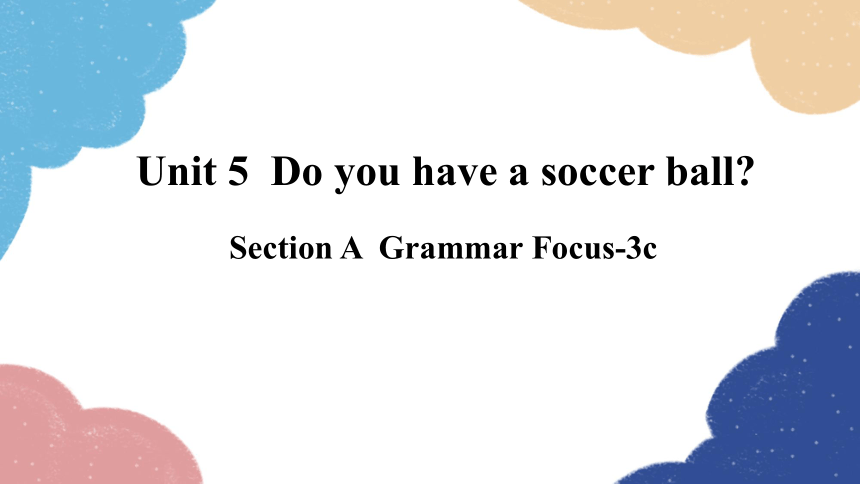 | |
| 格式 | pptx | ||
| 文件大小 | 2.1MB | ||
| 资源类型 | 教案 | ||
| 版本资源 | 人教新目标(Go for it)版 | ||
| 科目 | 英语 | ||
| 更新时间 | 2022-07-14 10:01:39 | ||
图片预览

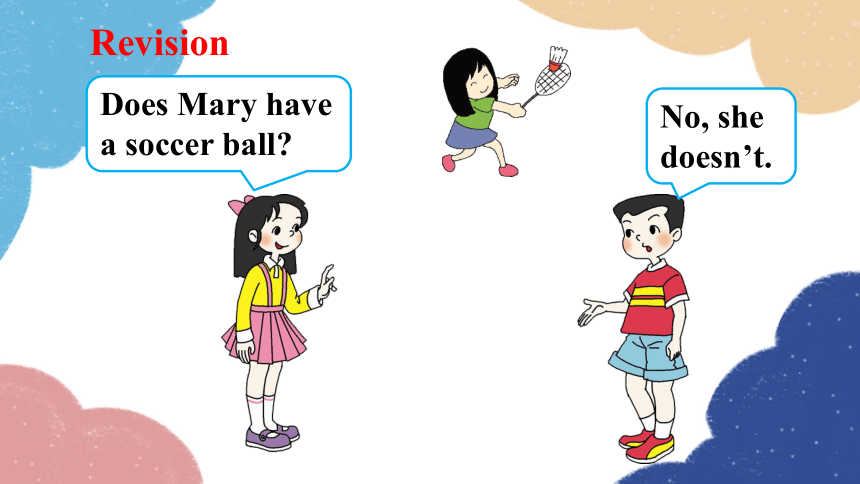

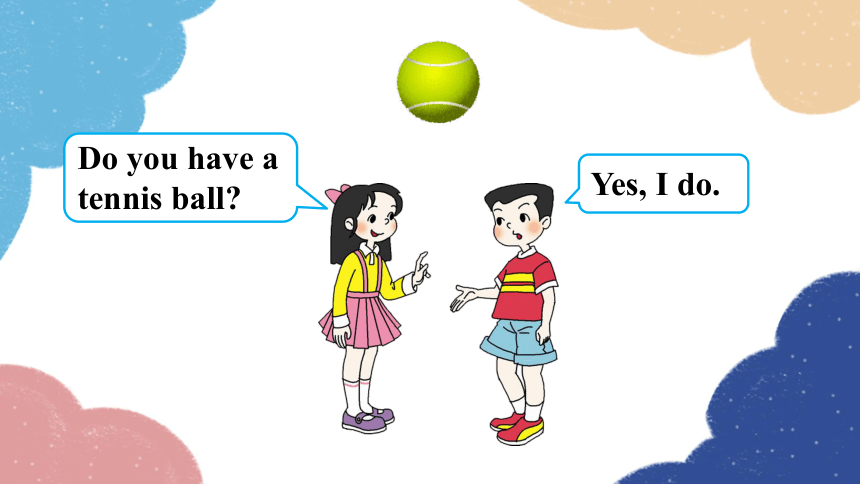
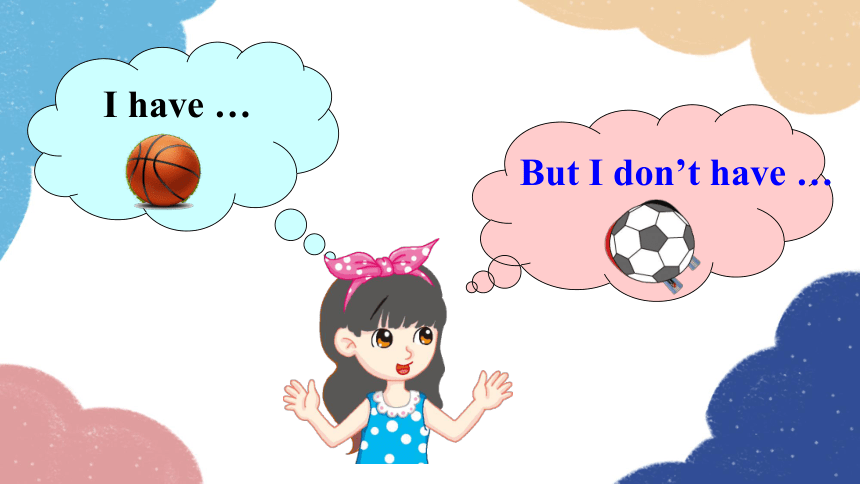
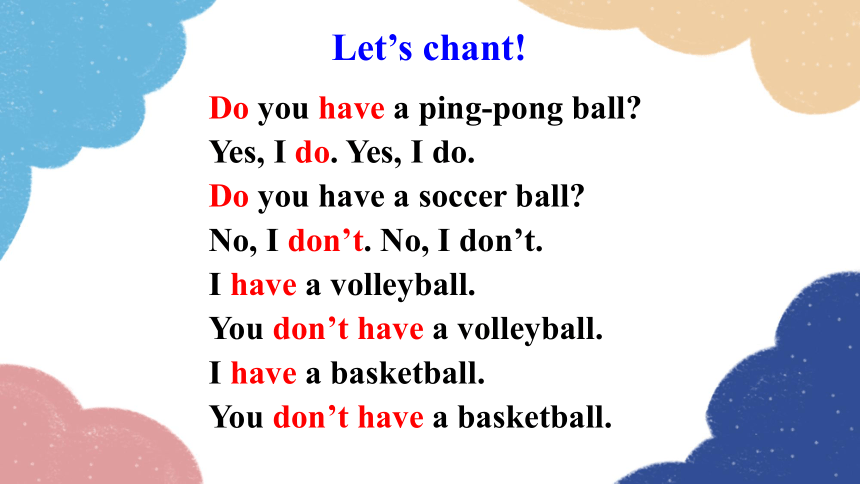
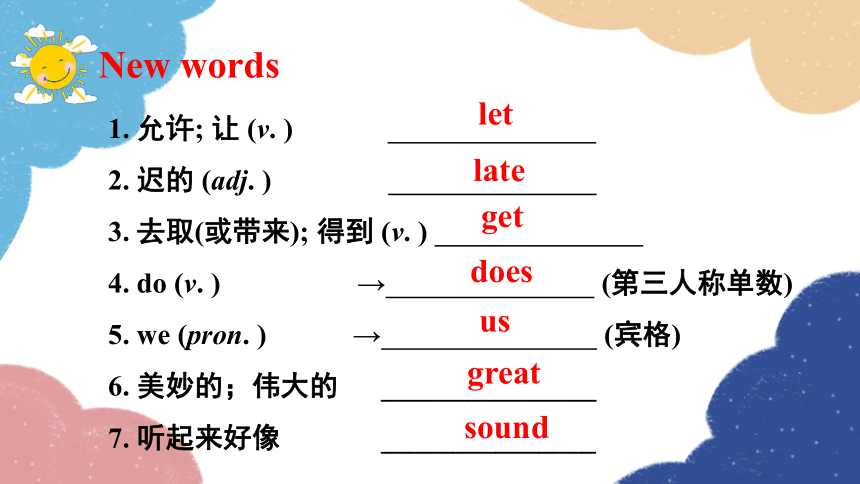
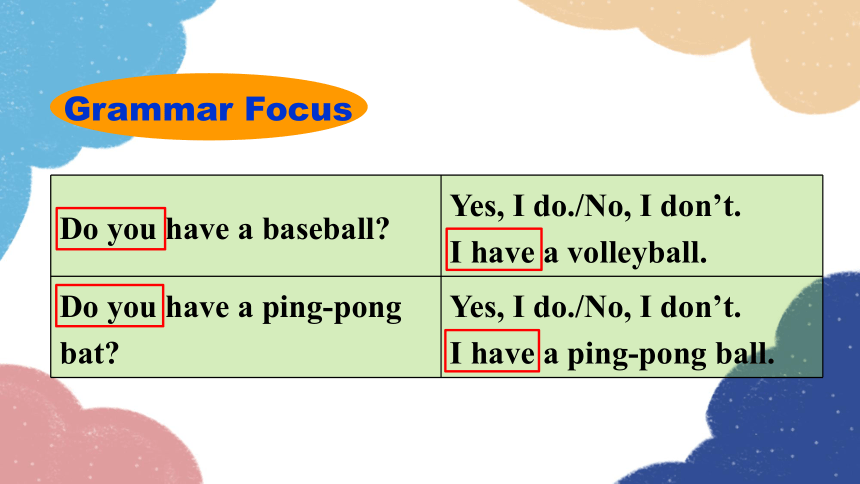
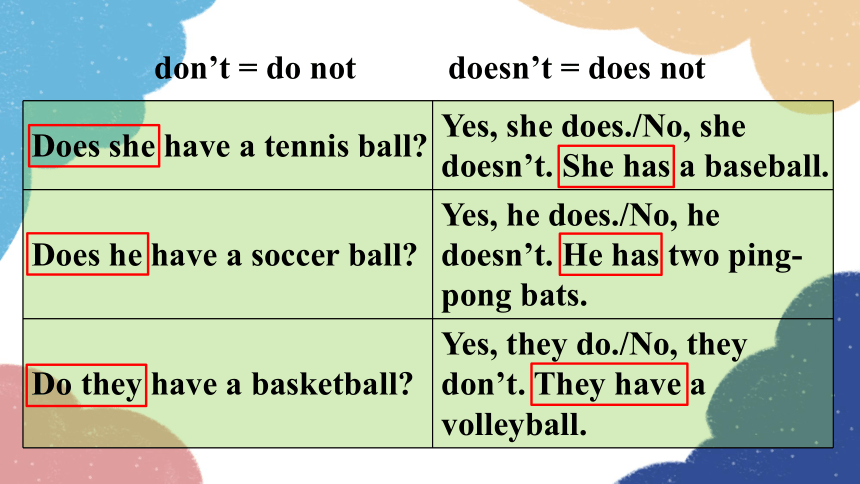
文档简介
(共28张PPT)
Unit 5 Do you have a soccer ball
Section A Grammar Focus-3c
Does Mary have a soccer ball
No, she doesn’t.
Revision
Do you have a baseball
No, I don’t.
Do you have a tennis ball
Yes, I do.
But I don’t have …
I have …
Let’s chant!
Do you have a ping-pong ball
Yes, I do. Yes, I do.
Do you have a soccer ball
No, I don’t. No, I don’t.
I have a volleyball.
You don’t have a volleyball.
I have a basketball.
You don’t have a basketball.
1. 允许; 让 (v. )
2. 迟的 (adj. )
3. 去取(或带来); 得到 (v. )
4. do (v. ) → (第三人称单数)
5. we (pron. ) → (宾格)
6. 美妙的;伟大的 _______________
7. 听起来好像 _______________
let
late
get
does
us
great
sound
New words
Do you have a baseball Yes, I do./No, I don’t.
I have a volleyball.
Do you have a ping-pong bat Yes, I do./No, I don’t.
I have a ping-pong ball.
Grammar Focus
Does she have a tennis ball Yes, she does./No, she doesn’t. She has a baseball.
Does he have a soccer ball Yes, he does./No, he doesn’t. He has two ping-pong bats.
Do they have a basketball Yes, they do./No, they don’t. They have a volleyball.
don’t = do not doesn’t = does not
一般现在时中have 的用法
have意为“有; 拥有; 占有”, 表示所属关系, 有人称和数的变化, 其主语一般是人, 有时也可以是物。它的一般现在时的各种句式如下:
Language points
1. 肯定句: 主语+ have/has …
have用于复数名词、第一、二人称单复数或第三人称复数代词作主语的句子中; has 为have 的第三人称单数形式, 用于不可数名词、可数名词单数或第三人称单数代词作主语的句子中。
*你有很多好习惯。You have many good habits.
*汤姆有三个棒球。Tom has three baseballs.
2. 否定句: 主语+ don’t / doesn’t + have …
*我们没有钥匙。
We don’t have the key.
*她没有网球拍。
She doesn’t have a tennis racket.
3.一般疑问句:Do/Does+主语+have…?
肯定答语: Yes, 主语 + do/does.
否定答语: No, 主语 + don’t/doesn’t.
——你有自行车吗?
——是的,我有。/不,我没有。
— Do you have a bike
— Yes ,I do./No, I don’t.
①当have/has 后的名词被 some 修饰时,在否定句和疑问句中 some 一般要改为 any。
*你有钱吗? Do you have any money
②have/has 与 there be 当“有”讲时的区别:
have/has 与主语为所属关系,强调的是某人“拥有;占有”某物,主语一般为名词或代词;there be 句型强调的是一种客现存在的事实,为 there 引导的倒装句。
用 have/has 填空。
1. A dog _____ four legs. A bird ____ two legs.
2. Our school _____ a library.
3. We ____ 37 chairs in our classroom.
4. My sister ____ a nice toy car.
5. — Do Tom and his brother _____ a big bedroom
— Yes, they do.
has
has
has
have
has
have
Write each word in the correct place in the chart.
3a
I he they you we she it Eric
do does
I they
you we
he she
it Eric
3b
Fill in the blanks with do or does. Then practice the conversations with your partner.
A: you have a baseball
B: Yes, I .
A: Great! I have a bat. Let’s play!
Do
do
A: John have a soccer ball
B: No, he .
A: he have a ping-pong bat
B: Yes, he . I think he has a ping-pong ball, too.
A: Hmm… let’s ask.
Does
doesn’t
Does
does
A: your friends have a basketball
B: Yes, they . They have two basketballs.
A: Well, let’s play basketball.
B: That sounds good.
Do
do
3c
Remember the things in Bob’s room. Then close your books and ask and answer questions with a partner.
A: Does Bob have a soccer ball
B: Yes, he does.
Does Bob have a basketball
Yes, he does.
Play roles
Does Bob have a baseball
Yes, he does.
Does Bob have a ...
...
Work in pairs
Yes, he does. / No, he doesn’t.
Does she have a …
Yes, she does. / No, she doesn’t.
Does he have a …
Make a survey. Write down the things you have and ask your partner what things she/ he has.
Things you have Things you don’t have Things she/ he has Things she/ he doesn’t have
Use these sentences:
A: Do you have … (a ruler, an eraser …)
B: Yes, I do./ No, I don’t.
A: Does he/ she have … (a ruler, an eraser …)
C: Yes, he/ she does./ No, he/ she doesn’t.
Ⅰ. 选择方框内合适的词填空。
1. — Let’s go to the movies (看电影) .
— That great.
2. My grandfather a radio. He listens to
it every day.
3. Tom and Jim a nice and big room.
sounds
has
have
Exercise
sounds have has don’t play
4. — Let’s soccer.
— That’s OK.
5. — Do you have a ping-pong ball
— No, I .
play
don’t
Sounds have has don’t play
Ⅱ. 单项选择。
1. — Let’s play volleyball.
— That sounds good.
A. the B. a C. an D. /
2. they a tape player
A. Do; have B. Does; have
C. Are; have D. Do; has
3. — Does he have a baseball
— But he has a baseball bat.
A. Yes, he does. B. Yes, he do.
C. No, he doesn’t. D. No, he don’t.
4. — Is this tennis racket (网球拍)
— Yes, it’s .
A. hers; her B. his; his
C. his; her D. your; hers
5. This is my volleyball and that tennis ball is .
A. brother; mine B. brother’s; mine
C. brother; my D. brother’s; my
Unit 5 Do you have a soccer ball
Section A Grammar Focus-3c
Does Mary have a soccer ball
No, she doesn’t.
Revision
Do you have a baseball
No, I don’t.
Do you have a tennis ball
Yes, I do.
But I don’t have …
I have …
Let’s chant!
Do you have a ping-pong ball
Yes, I do. Yes, I do.
Do you have a soccer ball
No, I don’t. No, I don’t.
I have a volleyball.
You don’t have a volleyball.
I have a basketball.
You don’t have a basketball.
1. 允许; 让 (v. )
2. 迟的 (adj. )
3. 去取(或带来); 得到 (v. )
4. do (v. ) → (第三人称单数)
5. we (pron. ) → (宾格)
6. 美妙的;伟大的 _______________
7. 听起来好像 _______________
let
late
get
does
us
great
sound
New words
Do you have a baseball Yes, I do./No, I don’t.
I have a volleyball.
Do you have a ping-pong bat Yes, I do./No, I don’t.
I have a ping-pong ball.
Grammar Focus
Does she have a tennis ball Yes, she does./No, she doesn’t. She has a baseball.
Does he have a soccer ball Yes, he does./No, he doesn’t. He has two ping-pong bats.
Do they have a basketball Yes, they do./No, they don’t. They have a volleyball.
don’t = do not doesn’t = does not
一般现在时中have 的用法
have意为“有; 拥有; 占有”, 表示所属关系, 有人称和数的变化, 其主语一般是人, 有时也可以是物。它的一般现在时的各种句式如下:
Language points
1. 肯定句: 主语+ have/has …
have用于复数名词、第一、二人称单复数或第三人称复数代词作主语的句子中; has 为have 的第三人称单数形式, 用于不可数名词、可数名词单数或第三人称单数代词作主语的句子中。
*你有很多好习惯。You have many good habits.
*汤姆有三个棒球。Tom has three baseballs.
2. 否定句: 主语+ don’t / doesn’t + have …
*我们没有钥匙。
We don’t have the key.
*她没有网球拍。
She doesn’t have a tennis racket.
3.一般疑问句:Do/Does+主语+have…?
肯定答语: Yes, 主语 + do/does.
否定答语: No, 主语 + don’t/doesn’t.
——你有自行车吗?
——是的,我有。/不,我没有。
— Do you have a bike
— Yes ,I do./No, I don’t.
①当have/has 后的名词被 some 修饰时,在否定句和疑问句中 some 一般要改为 any。
*你有钱吗? Do you have any money
②have/has 与 there be 当“有”讲时的区别:
have/has 与主语为所属关系,强调的是某人“拥有;占有”某物,主语一般为名词或代词;there be 句型强调的是一种客现存在的事实,为 there 引导的倒装句。
用 have/has 填空。
1. A dog _____ four legs. A bird ____ two legs.
2. Our school _____ a library.
3. We ____ 37 chairs in our classroom.
4. My sister ____ a nice toy car.
5. — Do Tom and his brother _____ a big bedroom
— Yes, they do.
has
has
has
have
has
have
Write each word in the correct place in the chart.
3a
I he they you we she it Eric
do does
I they
you we
he she
it Eric
3b
Fill in the blanks with do or does. Then practice the conversations with your partner.
A: you have a baseball
B: Yes, I .
A: Great! I have a bat. Let’s play!
Do
do
A: John have a soccer ball
B: No, he .
A: he have a ping-pong bat
B: Yes, he . I think he has a ping-pong ball, too.
A: Hmm… let’s ask.
Does
doesn’t
Does
does
A: your friends have a basketball
B: Yes, they . They have two basketballs.
A: Well, let’s play basketball.
B: That sounds good.
Do
do
3c
Remember the things in Bob’s room. Then close your books and ask and answer questions with a partner.
A: Does Bob have a soccer ball
B: Yes, he does.
Does Bob have a basketball
Yes, he does.
Play roles
Does Bob have a baseball
Yes, he does.
Does Bob have a ...
...
Work in pairs
Yes, he does. / No, he doesn’t.
Does she have a …
Yes, she does. / No, she doesn’t.
Does he have a …
Make a survey. Write down the things you have and ask your partner what things she/ he has.
Things you have Things you don’t have Things she/ he has Things she/ he doesn’t have
Use these sentences:
A: Do you have … (a ruler, an eraser …)
B: Yes, I do./ No, I don’t.
A: Does he/ she have … (a ruler, an eraser …)
C: Yes, he/ she does./ No, he/ she doesn’t.
Ⅰ. 选择方框内合适的词填空。
1. — Let’s go to the movies (看电影) .
— That great.
2. My grandfather a radio. He listens to
it every day.
3. Tom and Jim a nice and big room.
sounds
has
have
Exercise
sounds have has don’t play
4. — Let’s soccer.
— That’s OK.
5. — Do you have a ping-pong ball
— No, I .
play
don’t
Sounds have has don’t play
Ⅱ. 单项选择。
1. — Let’s play volleyball.
— That sounds good.
A. the B. a C. an D. /
2. they a tape player
A. Do; have B. Does; have
C. Are; have D. Do; has
3. — Does he have a baseball
— But he has a baseball bat.
A. Yes, he does. B. Yes, he do.
C. No, he doesn’t. D. No, he don’t.
4. — Is this tennis racket (网球拍)
— Yes, it’s .
A. hers; her B. his; his
C. his; her D. your; hers
5. This is my volleyball and that tennis ball is .
A. brother; mine B. brother’s; mine
C. brother; my D. brother’s; my
同课章节目录
- starters 预备篇(2012秋审查)
- Unit 1 Good morning !
- Unit 2 What’s this in English?
- Unit 3 What color is it ?
- Unit 1 My name's Gina.
- Section A
- Section B
- Unit 2 This is my sister.
- Section A
- Section B
- Unit 3 Is this your pencil?
- Section A
- Section B
- Unit 4 Where's my schoolbag?
- Section A
- Section B
- Unit 5 Do you have a soccer ball?
- Section A
- Section B
- Unit 6 Do you like bananas?
- Section A
- Section B
- Unit 7 How much are these socks?
- Section A
- Section B
- Unit 8 When is your birthday?
- Section A
- Section B
- Unit 9 My favorite subject is science.
- Section A
- Section B
